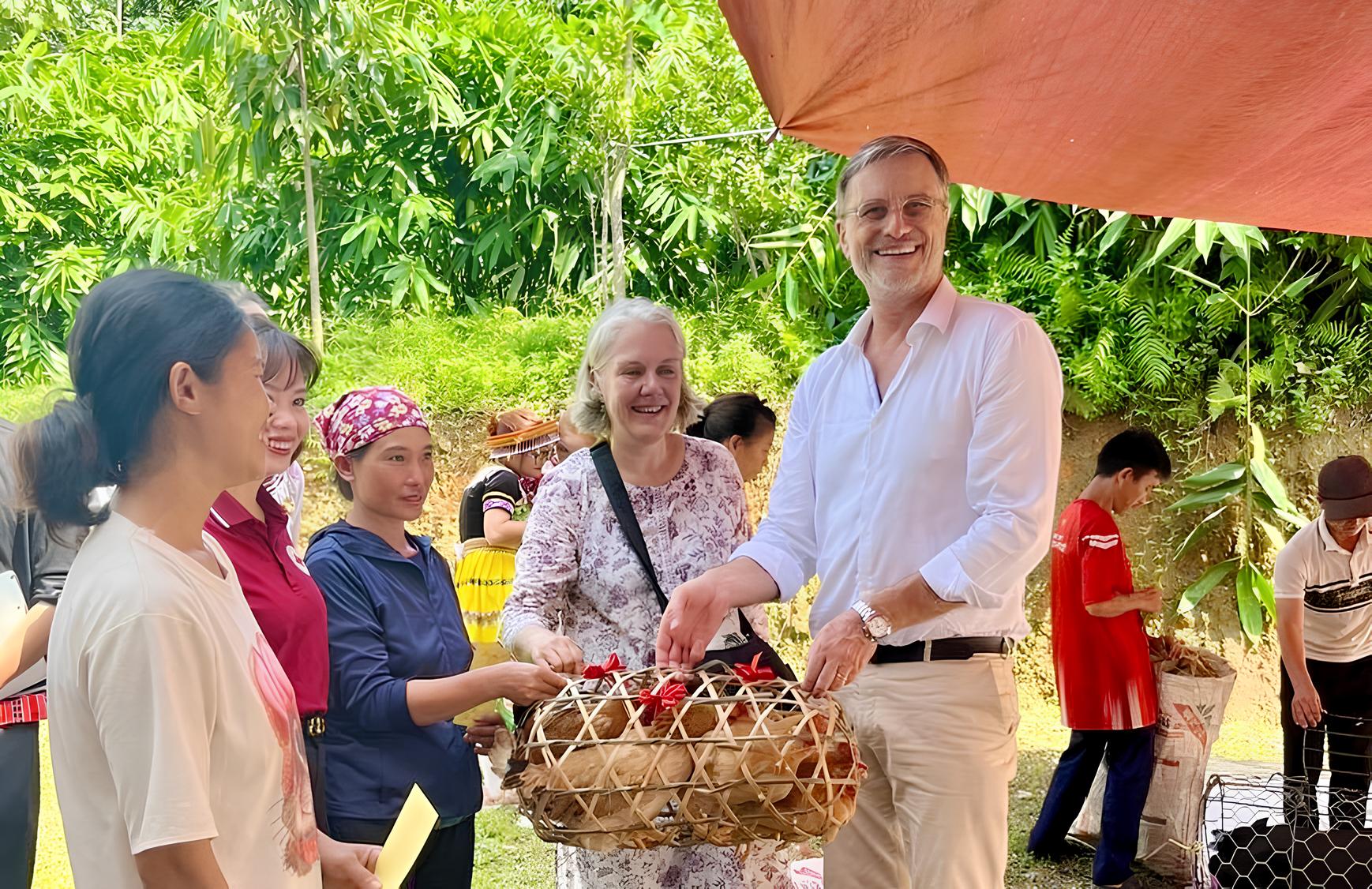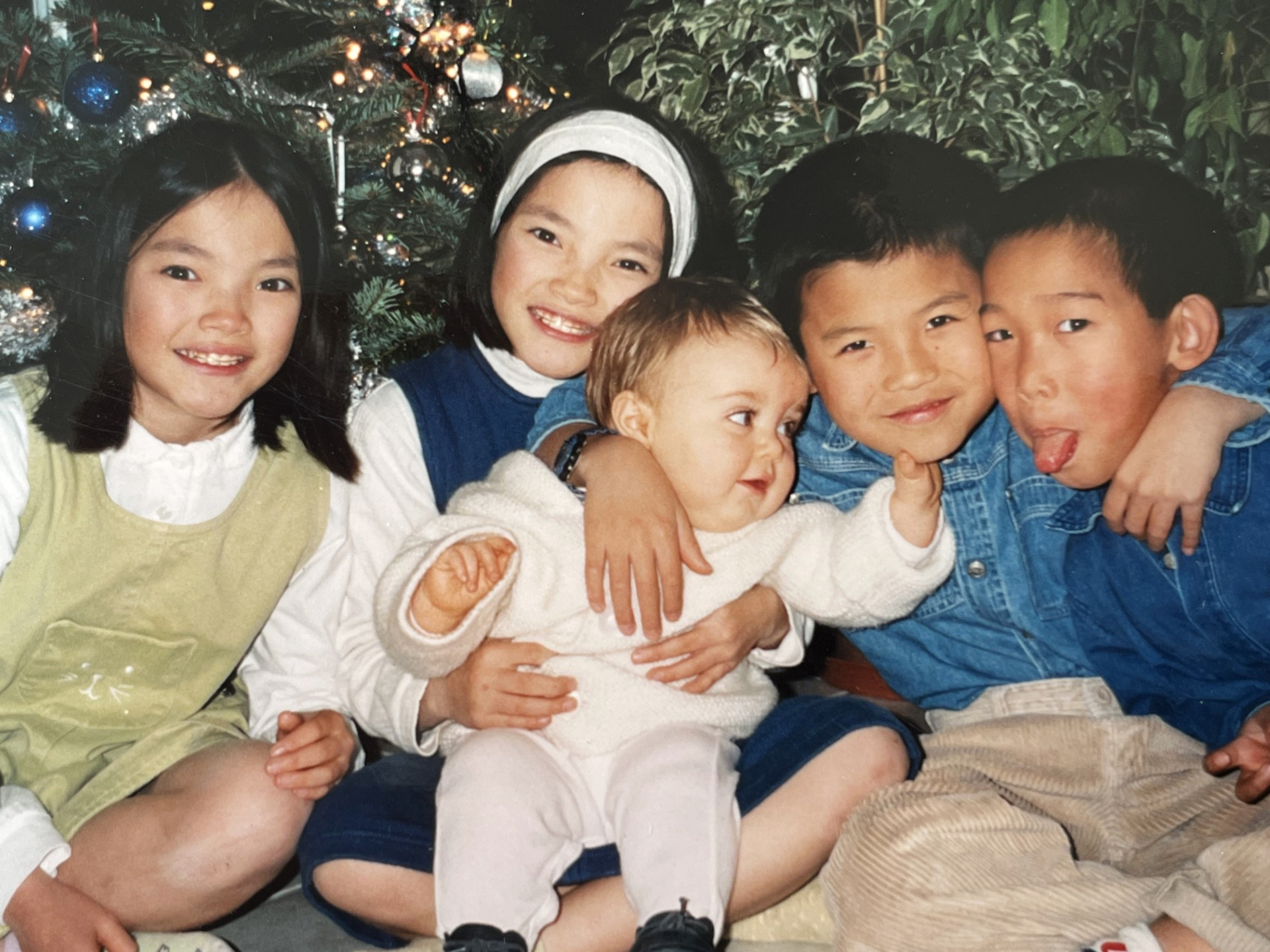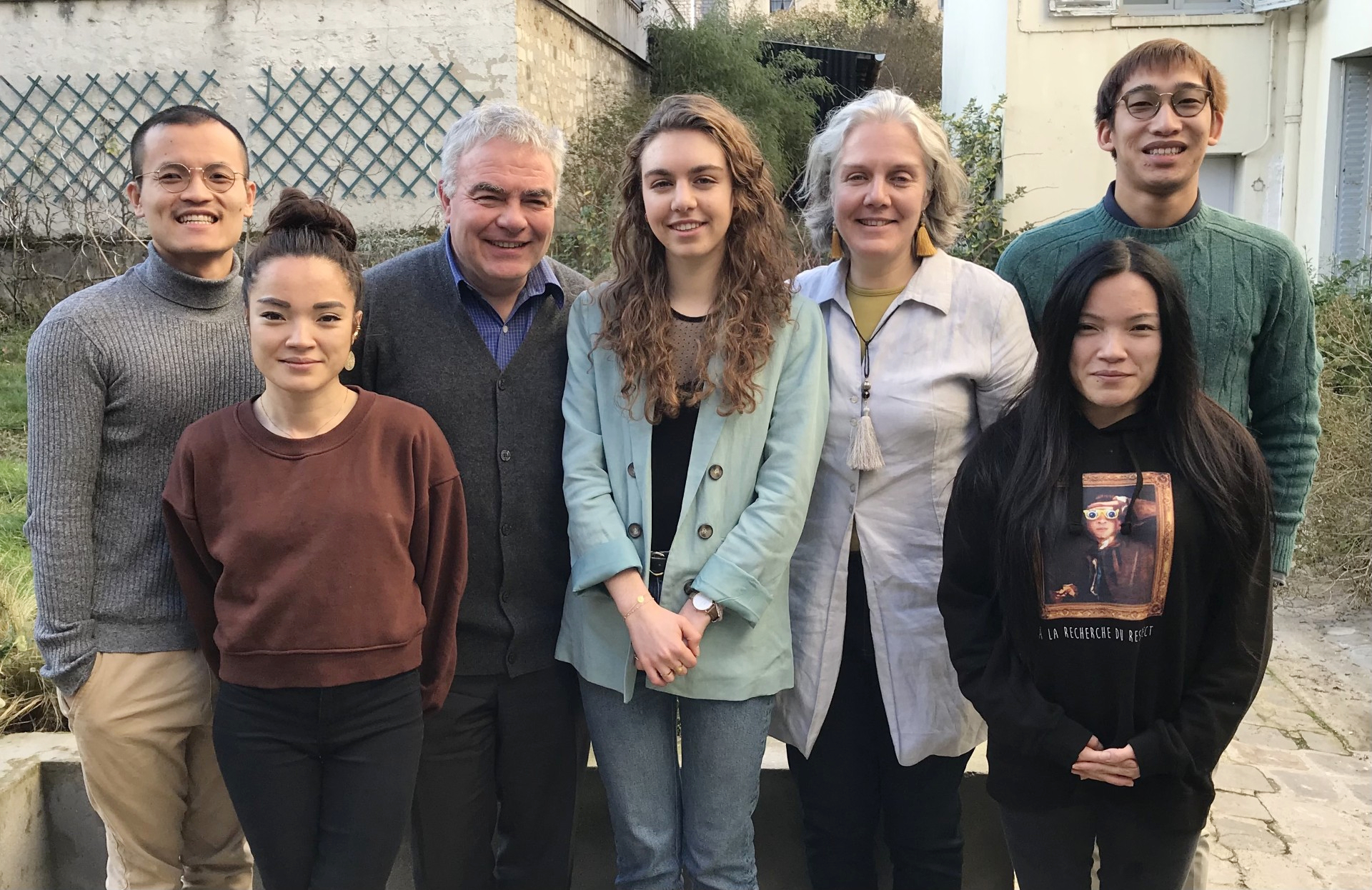This summer, on her 80th trip, Cavalier was honored by the Vietnamese government for her tireless contributions, coinciding with the 80th anniversary of National Day.
"This recognition is the result of 32 years of working with EPVN. I consider it a symbolic number," Cavalier said.
 |
Florence Cavalier and Olivier Brochet, French ambassador to Vietnam, donate pigs and chickens to families in need in Khuoi Chau village, Vi Xuyen district, Ha Giang (now Tuyen Quang province). Photo: EPVN |
Florence Cavalier and Olivier Brochet, French ambassador to Vietnam, donate pigs and chickens to families in need in Khuoi Chau village, Vi Xuyen district, Ha Giang (now Tuyen Quang province). Photo: EPVN
Her journey began with personal heartache. Born with a uterine malformation and having suffered multiple miscarriages, Florence was nearly unable to become a mother. In 1993, this longing led her and her husband, a physiotherapist and a financial expert, to an orphanage in Can Tho. Among dozens of children affected by the war, they adopted frail twins with hydrocephalus.
"It was both happiness and pain. At that moment, I knew my life would be tied to Vietnam," said 58-year-old Florence, from Yvelines province, France.
For the first two months, Nhi Dong 2 Hospital was their home. The following years were spent at Necker Hospital in Paris for their children's respiratory treatments. She recalled, "That Christmas, Paris was brightly lit, but I was still holding my daughter Aurelia in the emergency room."
Love for children guided her subsequent journeys. In 1995, the couple adopted their third child, Benoit, from a center in Ho Chi Minh City. Though physically healthy, the boy carried deep emotional scars. When Florence had to return to France, leaving her son in her husband's care for 10 days, Benoit became almost silent, withdrawing into himself for fear of being abandoned again. "That fear haunted him for years," she said.
Their fourth adopted child, Hugo, joined the family in 1998, born prematurely at 30 weeks, weighing only 1.2 kg. He spent two months in an incubator and couldn't lift his head until he was 5 months old. Jean-Paul, her husband, diligently performed physical therapy exercises on him every day, following his wife's instructions from France. Hugo's journey then involved years of respiratory, speech, and motor therapy. He didn't walk until he was two and used medication to manage hyperactivity.
 |
The four Vietnamese adoptees and the couple's biological daughter in 2003. Photo: Provided by the family |
The four Vietnamese adoptees and the couple's biological daughter in 2003. Photo: Provided by the family
After adopting four Vietnamese children, in 2003, Florence unexpectedly became pregnant and gave birth to her daughter, Heloise.
But the fear of being replaced by a biological child arose in 7-year-old Benoit. The day Florence returned from the hospital, he had packed his belongings, ready to leave. She had to put everything aside to focus on Benoit's emotional well-being.
Gradually, family trips and evenings spent playing together created a strong bond. The older siblings opened up to their youngest sister. "I breastfed Heloise until she was one, and her siblings were curious and asked to try. I understood it was their way of connecting, so I let each of them taste it a few times," she shared.
Now all 5 children are grown. Hugo is a robotics engineer, Benoit is in software sales, twins Aurelia and Marie work in human resources and commerce at large companies, and the youngest, Heloise, is studying veterinary medicine.
But Florence's "debt" to Vietnamese children wasn't over. Raising her children inspired her to think of other children in need. In 2007, she and others founded EPVN with about 50 members, mostly parents of Vietnamese adoptees, to help orphaned children with disabilities and improve their living conditions.
With 14 years of experience at the Family Council, Florence collaborated with Yvelines province (France) to organize visits and work at orphanages in Bac Giang and Vung Tau.
Later, EPVN also built roads, brought clean water to villages, built schools, donated livestock, and opened vocational training classes to help the poor become self-sufficient. In the past 5 years, EPVN has contributed about 1 million USD, improving education, healthcare, and livelihoods for thousands of children and their families throughout Vietnam.
"I will always remember the meal in Ta Phin, Sapa, when a family slaughtered a pig to thank us, or a family giving a calf to a poorer household; or the simple fruits that the Ba Na people offered with such warm hearts," she shared.
 |
Florence, her husband, and their five children in 2025. Photo: Provided by the family |
Florence, her husband, and their five children in 2025. Photo: Provided by the family
Jean-Paul has always supported his wife's work, even though their house in the suburbs of Paris was filled with donated goods for years. Once, his wife was hospitalized in Vietnam with cholera. "In July 2024, while distributing pigs in Vi Xuyen, she almost fainted from the heat," he said.
Their children are also encouraged to maintain a connection with their roots. Aurelia volunteered in Bac Giang, Marie joined students to build bamboo trash cans. Hugo paved 2 km of concrete road and learned to make herbal medicine from a Red Dao family. Heloise has also accompanied her mother to Vietnam three times with veterinary students.
Among them, Hugo has the strongest connection to Asia. He is passionate about Asian cuisine, travels frequently, and once dreamed of marrying someone of Asian descent. That dream will come true on September 13th, when Hugo will marry a Korean woman, also an adoptee.
Double the joy this year. On the occasion of the 80th National Day, Florence was honored by the Vietnamese government, just as she completed her 80th mission there.
"I see this as a symbolic number. This recognition is the achievement of 32 years working with my team," she shared.
From 1993, when she sent the first batch of medical equipment to Tu Du Hospital, Florence and EPVN have provided thousands of Vietnamese children and families with opportunities for education, healthcare, and stable lives. Her sole motivation has always been "to help the poorest and sickest."
During her 80 trips back to Vietnam, one question Florence is often asked is: "Why is a French woman so deeply attached to Vietnam?"
Under a stilt house in Khuoi Chau village (Tuyen Quang), where she just donated livestock to families in need, the French woman smiled, her eyes warm: "Because Vietnam gave me the chance to be a mother."
Phan Duong












